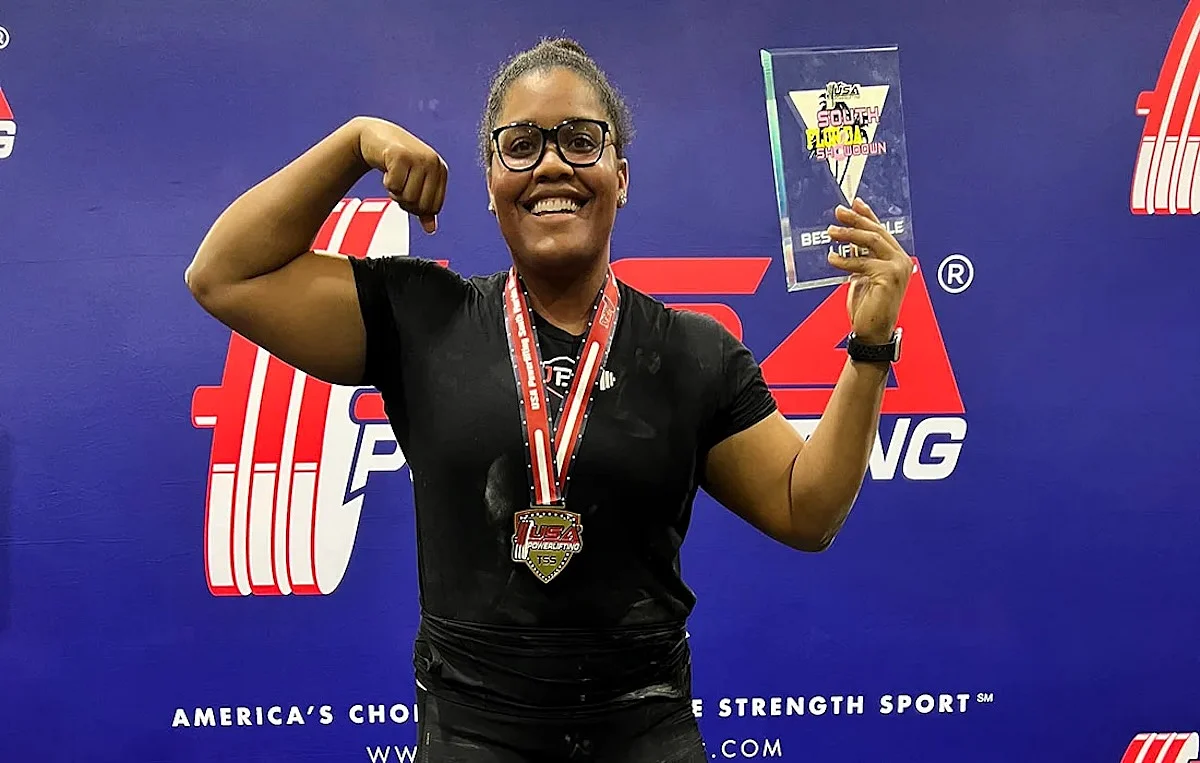For the Win: College Student Powerlifts Past Breast Cancer
By Dennis Thompson HealthDay Reporter
FRIDAY, July 25, 2025 — LaShae Rolle, 27, is a competitive powerlifter capable of squatting 441 pounds, benching 292 pounds and deadlifting 497 pounds.
Last year, breast cancer tried to derail Rolle's dreams of going up against the best of the best.
But Rolle steamrolled her cancer, keeping up an intense strength training program throughout her treatment.
And then she wrote a paper about it.
Rolle, a pre-doctoral fellow in public health sciences at the University of Miami, made herself the focus of a first-of-its-kind study documenting elite-level strength training while undergoing chemotherapy, a mastectomy and radiation treatment.
The study challenges long-held notions that cancer patients should stick to low- or moderate-intensity exercise, according to her report in the journal Lifestyle Medicine.
“Strength training has been central to my identity as both an athlete and a rising lifestyle oncology researcher,” Rolle said in a news release. “During cancer, it became a way to stay connected to who I am and to feel in control of my body and mind.”
By the end of treatment, Rolle had kept herself in contention, retaining nearly all the strength she’d built prior to her cancer diagnosis, results show.
“I’m proud I kept going,” she said. “Modifying my sessions around chemotherapy cycles helped me keep training safely, and physically, it gave me moments of normalcy even when everything else felt uncertain.”
Previous studies have shown that moderate-intensity aerobic exercise and strength training can reduce fatigue, improve physical function and alleviate treatment-related symptoms in cancer patients, researchers said in background notes.
But that research has tended to focus on average folks performing regular workouts, not elite athletes trying to maintain high-intensity efforts during treatment.
“LaShae’s journey is a powerful reminder that survivorship is not just about recovery — it’s about reclaiming strength, identity and purpose,” Tracy Crane, director of lifestyle medicine, prevention and digital health at the University of Miami’s Sylvester Comprehensive Cancer Center, said in a news release.
“Her commitment to powerlifting exemplifies how movement can be a form of healing, empowerment and advocacy,” added Crane, who is Rolle’s primary mentor and served as a senior researcher for the new study.
Rolle was diagnosed in 2024 with stage 2B breast cancer that was estrogen receptor-positive, meaning that female hormones were helping fuel the cancer. She had no genetic predisposition to breast cancer.
Her Miami colleagues helped her weave a strength training program into her cycles of chemotherapy. It included:
-
High-intensity days scheduled before chemo infusions, focused on squats, bench press and deadlifts.
-
Moderate days between chemo cycles, involving movements like rows and shoulder presses.
-
Recovery days just after an infusion including light mobility and therapy work.
By the end of her treatment, Rolle had retained 93% of her squat strength and 87% of her bench press and deadlift strength – rare numbers for someone going through chemo.
“Documenting everything on video and in a training diary kept me accountable and reminded me I was still strong,” Rolle added. “I am still in awe when I look back at videos of me lifting over 400 pounds in the midst of chemotherapy.”
These findings apply mainly to elite athletes with established high-intensity training backgrounds, rather than the average cancer patient, researchers noted.
But Rolle said this study shows how important it can be to craft treatment programs to the needs of specific patients.
“I’m absolutely encouraged to keep lifting and to keep advocating for evidence-based exercise as part of cancer care,” she said.
Sources
- University of Miami, news release, July 22, 2025
- Lifestyle Medicine, July 2025
Disclaimer: Statistical data in medical articles provide general trends and do not pertain to individuals. Individual factors can vary greatly. Always seek personalized medical advice for individual healthcare decisions.
© 2025 HealthDay. All rights reserved.
Posted July 2025
Read this next
HHS Withdraws Report Linking Alcohol To Higher Cancer Risks
MONDAY, Sept. 8, 2025 — Federal health officials have withdrawn a government report warning that even small amounts of alcohol could raise the risk of cancer and other...
Kids with High BP May Face Risk of Early Heart Disease Death as Adults
MONDAY, Sept. 8, 2025 — A heart health journey may start much earlier than once thought, as new research shows that kids with higher blood pressure at age 7 had a sharply...
Space Travel Accelerates Cellular Aging, Researchers Say
MONDAY, Sept. 8, 2025 — Space travel takes a significant toll on the human body, and a new study reveals that it can speed up the aging of crucial blood and immune...
More news resources
- FDA Medwatch Drug Alerts
- Daily MedNews
- News for Health Professionals
- New Drug Approvals
- New Drug Applications
- Drug Shortages
- Clinical Trial Results
- Generic Drug Approvals
Subscribe to our newsletter
Whatever your topic of interest, subscribe to our newsletters to get the best of Drugs.com in your inbox.

